BusinessEurope Headlines No. 2018-14
EU and U.S. business committed to the transatlantic relationship: need to avoid major trade disruptions

EU and U.S. business leaders met in Washington D.C. for the ‘Transatlantic Business Works’ summit jointly organised by BusinessEurope and the U.S. Chamber of Commerce on 16 April. The summit highlighted the benefits of the trade and investment relationship between the U.S. and Europe and fostered the dialogue about new opportunities for advancement and growth. Markus J. Beyrer, Director General of BusinessEurope, said: “The EU and the U.S. share opportunities and concerns and are equally affected by trade distortions. A trade war is not the answer to address shortcomings in the international trading system. Neither is recurring to disguised protectionism. We rather need concrete proposals building a positive agenda for change”. This was also the message conveyed to a number of senior officials in the U.S. Administration, including Deputy United States Trade Representative Jeffrey Gerrish. BusinessEurope pointed out that Europe and the U.S. should work together in building a more effective world trading system. We have common challenges, we should be able to agree on common answers.
Contact: Eleonora Catella
Our comment
The EU and Japan stand out as like-minded partners amid trade turmoil
By Maurice Fermont, International Relations Adviser
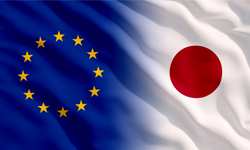
This week the College of Commissioners formally adopted the text of the EU-Japan Free-Trade Agreement, clearing the way for its signature by European Commission President Jean-Claude Juncker and Japanese Prime Minister Shinzō Abe at a summit on 12 July. This is an important milestone for an agreement that has been more than three years in the making, and the results are positive across the board.
It is one of the most ambitious trade agreements ever negotiated by the EU. Companies and consumers will save more than €1 billion annually from reduced or eliminated tariffs. Japan’s similar approach to regulation, consumer and product safety, as well as its removal of non-tariff barriers will improve market access for European companies. For the first time it also includes a chapter on small and medium-sized enterprises (SMEs) that pays particular attention to help SMEs navigate each other’s markets. And for the first time ever, it also includes a commitment to the Paris Climate agreement.
BusinessEurope is visiting Japan this week to voice our support for this agreement. We will participate in the EU-Japan Business Roundtable (BRT), an annual gathering of companies, to foster policy recommendations for Japan and the EU. The BRT has been a strong supporter of greater integration between our two markets. During our visit, we will also encourage key stakeholders in Japan to prepare for the ratification of the agreement so that consumers and companies can benefit from it as soon as possible.
The agreement is also a stepping-stone for cooperation in international fora. Japan and the EU have shared norms and values and a similar approach to regulation. At a time when trade barriers are on the rise and multilateral economic governance is under pressure, Japan and the EU are able to stand firm in defence of rules-based trade, cooperate in international bodies, and propose solutions to improve economic governance.
This week an important step has been made towards ratifying the agreement, unleashing its economic benefits, and stepping up cooperation between the EU and Japan on international economic issues.
Contact: Maurice Fermont
A stronger Framework Programme (FP9) would help scale up investments in research & innovation
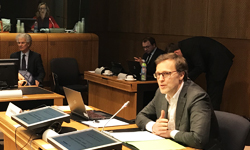 “The EU Framework programmes have a crucial role in leveraging more investments in research & innovation”, BusinessEurope Industrial Affairs Director Alexandre Affre stressed at the Council meeting of the Working Party for Research on 16 April. Affre highlighted that the EU continues to lag behind its main competitors such as the US, Japan and China and another 150 billion Euros would need to be invested to reach the EU target of spending 3% of its GDP in R&D by 2020. The next Framework Programme (FP9) offers an opportunity to increase the budget and strengthen the support to industrial innovation and close-to-market activities. This would have an enormous positive impact on the EU economy and would also address current and future societal challenges. These messages were also conveyed by Senior Adviser Jan Bambas at the meeting organised by the Federation of Austrian Industries (IV) in Vienna on 12 April. Bambas added that the European industry is fully committed to EU Framework Programmes and continues to increase the share of private investments in research & innovation. Last years’ figures show higher private spending in R&D despite the decrease in public funding.
“The EU Framework programmes have a crucial role in leveraging more investments in research & innovation”, BusinessEurope Industrial Affairs Director Alexandre Affre stressed at the Council meeting of the Working Party for Research on 16 April. Affre highlighted that the EU continues to lag behind its main competitors such as the US, Japan and China and another 150 billion Euros would need to be invested to reach the EU target of spending 3% of its GDP in R&D by 2020. The next Framework Programme (FP9) offers an opportunity to increase the budget and strengthen the support to industrial innovation and close-to-market activities. This would have an enormous positive impact on the EU economy and would also address current and future societal challenges. These messages were also conveyed by Senior Adviser Jan Bambas at the meeting organised by the Federation of Austrian Industries (IV) in Vienna on 12 April. Bambas added that the European industry is fully committed to EU Framework Programmes and continues to increase the share of private investments in research & innovation. Last years’ figures show higher private spending in R&D despite the decrease in public funding.
Contact: Jan Bambas
Looking ahead: free and fair trade should remain a key priority for the EU
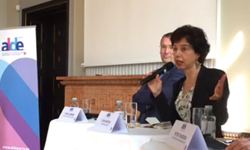 In a workshop organised by the ALDE group in Copenhagen to discuss the priorities for the EU after the European Parliament elections in May 2019, BusinessEurope stressed the importance of supporting a rules-based trading system. “The trade agenda of the future European Commission should be ambitious, creating new market opportunities for European companies. The EU needs to remain a leader in promoting free and fair trade”, Director for International Relations Luisa Santos said. In a moment the world trading system is under considerable pressure, she added, with a trade war looming between China and the U.S., the EU needs to show leadership using its network of free trade agreements. Bettering rules, promoting high level standards and supporting the role of the World Trade Organisation (WTO) should be central in the trade agenda of the new European Commission. “The EU should engage actively with both China and the U.S. to address shortcomings in the current rules and avoid major trade disruptions”, Santos stated.
In a workshop organised by the ALDE group in Copenhagen to discuss the priorities for the EU after the European Parliament elections in May 2019, BusinessEurope stressed the importance of supporting a rules-based trading system. “The trade agenda of the future European Commission should be ambitious, creating new market opportunities for European companies. The EU needs to remain a leader in promoting free and fair trade”, Director for International Relations Luisa Santos said. In a moment the world trading system is under considerable pressure, she added, with a trade war looming between China and the U.S., the EU needs to show leadership using its network of free trade agreements. Bettering rules, promoting high level standards and supporting the role of the World Trade Organisation (WTO) should be central in the trade agenda of the new European Commission. “The EU should engage actively with both China and the U.S. to address shortcomings in the current rules and avoid major trade disruptions”, Santos stated.
Contact: Luisa Santos
Labour Ministers should focus on improving the framework conditions for employment and enterprise development
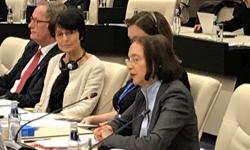 The signs in Europe are encouraging in terms of growing employment, but high levels of unemployment in some EU Member States combined with increasing skills shortages across Europe need to be addressed. The EU Member States should tackle the structural bottlenecks they face to well-functioning labour markets. For example, ensuring that young people have the necessary basic skills, including digital skills, and fostering a dual approach to university education can help achieve a better matching of skills and jobs. By contrast, the EU should not intervene in defining work in a way that would hamper Member States’ ability to adapt their frameworks to changing needs and economic and social realities. These were the key messages given by Renate Hornung-Draus, Vice-Chair of BusinessEurope’s Social Affairs Committee, at the informal Employment and Social Affairs Council meeting held in Sofia, Bulgaria, on 17-18 April on the theme “Investing in people: a lifecycle approach”. She added that to address these challenges, a more forceful implementation of national reforms is needed in the framework of the European Semester, in cooperation with the social partners. Furthermore, the EU Member States also need to defend the role of social dialogue globally, ensuring that the ongoing debates on the United Nations reform do not jeopardise the tripartite governance of the International Labour Organisation and the role of social partners in shaping social policy at national, European and international level.
The signs in Europe are encouraging in terms of growing employment, but high levels of unemployment in some EU Member States combined with increasing skills shortages across Europe need to be addressed. The EU Member States should tackle the structural bottlenecks they face to well-functioning labour markets. For example, ensuring that young people have the necessary basic skills, including digital skills, and fostering a dual approach to university education can help achieve a better matching of skills and jobs. By contrast, the EU should not intervene in defining work in a way that would hamper Member States’ ability to adapt their frameworks to changing needs and economic and social realities. These were the key messages given by Renate Hornung-Draus, Vice-Chair of BusinessEurope’s Social Affairs Committee, at the informal Employment and Social Affairs Council meeting held in Sofia, Bulgaria, on 17-18 April on the theme “Investing in people: a lifecycle approach”. She added that to address these challenges, a more forceful implementation of national reforms is needed in the framework of the European Semester, in cooperation with the social partners. Furthermore, the EU Member States also need to defend the role of social dialogue globally, ensuring that the ongoing debates on the United Nations reform do not jeopardise the tripartite governance of the International Labour Organisation and the role of social partners in shaping social policy at national, European and international level.
Contact: Maxime Cerutti
Designing employee training in a way that supports productivity gains
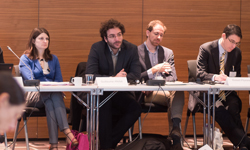 The training that companies provide to their employees should be clearly linked to an identified demand by the company and worker to improve productivity and enable a company to increase its output. This was a key theme that emerged from the last seminar of the EU social partners’ project on promoting social partnership in employee training that was held in Stockholm on 17-18 April. The seminar brought together employer and trade union representatives from Sweden, Ireland, France and Estonia. A final report on the outcomes of the project will now be prepared and presented at a conference in June.
The training that companies provide to their employees should be clearly linked to an identified demand by the company and worker to improve productivity and enable a company to increase its output. This was a key theme that emerged from the last seminar of the EU social partners’ project on promoting social partnership in employee training that was held in Stockholm on 17-18 April. The seminar brought together employer and trade union representatives from Sweden, Ireland, France and Estonia. A final report on the outcomes of the project will now be prepared and presented at a conference in June.
Photo copyright: Philippe Doutrewé
Contact: Robert Plummer
Calendar
- 25 April: Company law package
- 25 April: Digital Single Market 3rd data package
- 27 April: Eurogroup Meeting
- 27-28 April: Informal Meeting of Economic and Financial Affairs Ministers